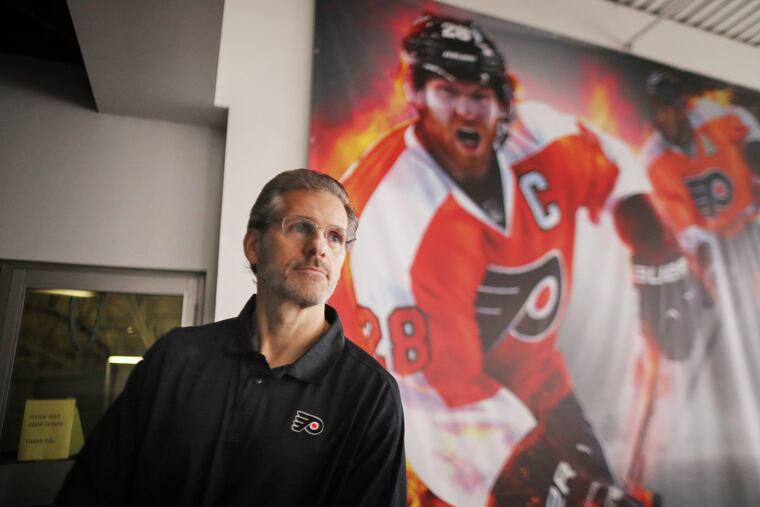The Flyers fired Ron Hextall. Here are a few thoughts on how we got here. | Mike Sielski
The decision to fire Hextall doesn't change how far the Flyers have to go to rebuild. In fact, it is consistent with their history.

A few thoughts in the wake of the Flyers' decision to fire general manager Ron Hextall:
1. Much has been made of the Flyers' farm system, of the depth and talent it has or is supposed to have. It is true that Hextall made great strides in replenishing it. But here's the thing: The Flyers went through a nine-year stretch in which they drafted poorly, failed to develop decent prospects into decent players, or traded draft picks for immediate help. Nine years, from '04-12, and the only drafted players who made impacts were Claude Giroux, Sean Couturier and Shayne Gostisbehere.
The awfulness of that period meant that the organization's infrastructure needed to be rebuilt from the ground up, and since Hextall didn't hire Dave Hakstol as coach until 2015, the Flyers had been genuinely rebuilding for four years. That's less than half the time they spent hollowing out their farm system, which is why I recently wrote that the Flyers had "miles to go" in replenishing their talent pool.
No matter how ballyhooed many of those prospects and young players are, not all of them — maybe not even most of them — are going to turn into stars or even solid NHL players. Consider, for instance, the news this week that German Rubtsov will miss the rest of this season with a shoulder injury. That stuff happens, and the way to mitigate it is to stockpile as many draft picks and prospects as possible, which Hextall was doing. (The Phillies, by the way, went through a similar period from 2007 to 2013, and they're still trying to dig their way out.)
2. There seem to be a lot of fans saying, "OK, now it's time to fire Hakstol, who should have been fired long ago anyway." A popular choice to replace him seems to be Joel Quenneville, who must be brilliant because he won three Stanley Cups with the Blackhawks, who recently fired him.
Nothing against Quenneville, but he was much less brilliant in these last few years, after the Hawks made some questionable player-personnel decisions and weren't as talented a team. Peter DeBoer missed the playoffs each of his three years with the Florida Panthers, then coached the New Jersey Devils and San Jose Sharks to the Stanley Cup Final when he had better clubs. John Tortorella won a Cup in Tampa with the Lightning, had a good run with the Rangers before flaming out, had a bad stint in Vancouver, and seems to have learned from that; he's been solid in Columbus. Circumstances matter, and the fact that, over the last six years, the Flyers have produced similar results for three different coaches with the same core is, to me, telling.
3. Said it before, saying it again: The Flyers' playoff berths in '16 and '18 were, in a weird way, counterproductive because they obscured the fact the team was rebuilding. That doesn't mean that Hextall was effective in all his moves/decisions or that Hakstol is the second coming of Toe Blake. But it does mean that it made it easier for fans/members of the organization to fall back into the same urgency/impatience that has characterized the franchise's history.
Speaking of that history, below is an excerpt from a 2013 column I wrote after the news conference at which the Flyers announced the firing of Peter Laviolette and the hiring of Craig Berube – the same news conference at which Ed Snider, then the Flyers' owner and chairman, said, "We don't need a fresh approach," even though the team had not, and has not, won a Stanley Cup since 1975.
The Flyers' lack of patience, their unwillingness to consider a longer view or embrace an innovation before it's already become old hat, their reliance on the tired cliché of "Flyers hockey" — together, those factors have created a vicious cycle that has kept them from achieving their ultimate goal. …
An identity can be a franchise's worst enemy. Consider the Chicago Blackhawks. They went through a dormant decade, missing the postseason nine times in 10 years and falling into irrelevancy. But in an interview earlier this year, Blackhawks president John McDonough and general manager Stan Bowman acknowledged that the hidden benefit of all that losing was that … it allowed the franchise to restart with a clean slate. There was no tradition to uphold anymore. The Blackhawks weren't beholden to their own history. They could remake themselves however they chose, and all they've done since is win two of the last four Stanley Cups.
"So should we try to come in last?" Flyers GM Paul Holmgren asked. No, but a new approach is overdue and has been for a while.
Just food for thought …